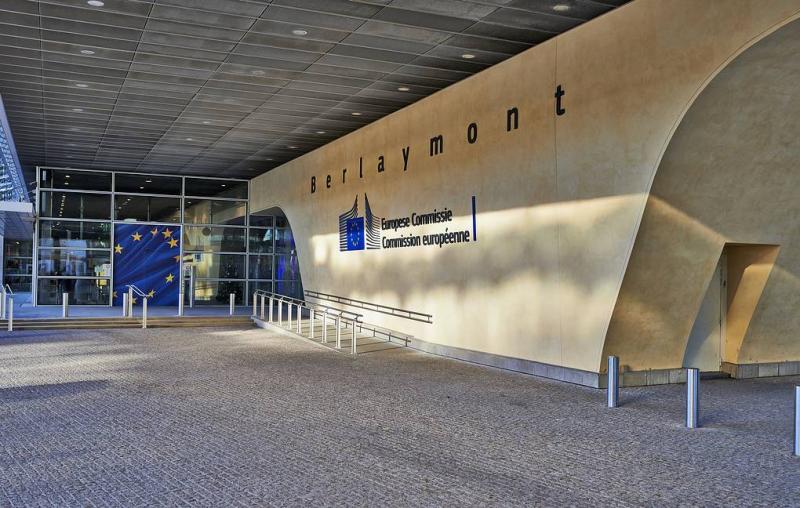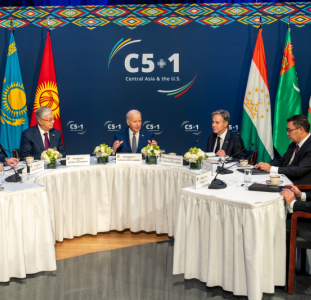
© CapturePB/Shutterstock/FOTODOM
Top stories from the Russian press on Thursday, June 16th, prepared by TASS
Izvestia: EU weighs granting candidate status to Ukraine
The European Commission will soon announce whether Ukraine should be granted EU candidate status. Russia used to be okay with Kiev’s desire to join the European Union but Moscow’s position has changed since the start of the special operation, Izvestia writes.
The EU was initially designed to be an integration body but now it is turning into an organization that seeks to influence processes beyond its borders in terms of its interests, using economic and political tools, with the possibility of employing military tools in the future, Federation Council Deputy Speaker Konstantin Kosachev told the newspaper.
Ukrainian President Vladimir Zelensky will probably discuss his country’s EU prospects with German Chancellor Olaf Scholz, Italian Prime Minister Mario Draghi and French President Emmanuel Macron during their visit to Kiev on June 16. The parties are likely to discuss other issues, too, because Western officials have been talking more and more about the need to end hostilities and get to the negotiating table.
"The official positions of Western countries are changing very slowly so we can’t record any crucial shift," Russian International Affairs Council Director General Andrey Kortunov explained. "However, if we look at the general mood of those who can be described as the political elite, we will see a slight change in their tone compared to a month ago because doubts are growing that Ukraine will be able to launch a successful offensive and implement the plans that it had announced right after the conflict had broken out," he added.
The expert does not rule out that the visit by the German, Italian and French leaders is aimed "at testing the waters to figure out how flexible Kiev’s position is." The question is whether the position may be softened because while changing their rhetoric, Western countries are stepping up military assistance to Ukraine, Kortunov emphasized.
Nezavisimaya Gazeta: US suspects China of readying special operation in Taiwan
Chinese President Xi Jinping has signed an order providing a legal framework for unusual actions by the armed forces. The US media took it as the start of preparations for Taiwan’s reunification with China modeled after Russia’s actions in Ukraine, Nezavisimaya Gazeta notes.
According to the People's Daily, the official newspaper of the Central Committee of the Chinese Communist Party, the document is about tentative provisions "on the army’s activities of non-military nature." American reporter Andrew Thornebrooke believes that Xi may be creating a legal basis that will make it possible to engage in combat without calling the conflict a war. It is also possible that it all relates to Taiwan or Beijing’s increasing control over the South China Sea.
"In fact, the Chinese have trained the use of the armed forces for non-military purposes before. Particularly, for assisting in dealing with natural disasters. And now they plan to use their armed forces to achieve political goals, which is a new thing," Leading Researcher at the Russian Academy of Sciences’ Institute of Far Eastern Studies Pavel Kamennov pointed out.
"A thing to note is that Beijing has experience of reuniting Hong Kong and Macao with mainland China. Beijing got those territories without using military force. China is not interested in resolving the Taiwan issue by military means either. No one needs Taiwan in ruins. China needs Taiwan the way it is now. It is a major supplier of chips and other electronic devices with a strong economy. Besides, trade between China and Taiwan reached $320 bln in 2021. More than one mln Taiwanese run businesses in mainland China. About the same number of Chinese citizens work in Taiwan," the expert explained. That said, China is interested in a peaceful reunification but does not rule out using the army without employing fire power, Kamennov stressed.
Nezavisimaya Gazeta: Moscow in search of alternatives to Geneva talks on Syria
Moscow is unwilling to continue holding talks on Syria in Geneva. According to Russian Special Presidential Envoy for Syria Alexander Lavrentyev, Russia has suggested changing the location of the Constitutional Committee’s meetings as the Swiss platform has lost its neutral status, Nezavisimaya Gazeta writes.
Lavrentyev made the statement in Kazakhstan’s Nur-Sultan, where an Astana Format meeting involving Russia, Turkey and Iran kicked off on June 15. The diplomat also did not rule out that the international cross-border aid mechanism for Syria’s restive areas, which will expire in July, would not be extended, but new mechanisms for providing aid and restoring the Syrian economy would be created. These measures are clearly aimed at showing that Moscow remains focused on the Syria issue.
"The big question is how the United Nations will react to the suggested relocation, while meetings not held under the UN auspices make no sense," Russian International Affairs Council expert Anton Mardasov noted. "Damascus and Moscow would be happy if the talks were relocated to the United Arab Emirates because it would give them legitimacy in the eyes of the Arab world but in this case, issues with other players will emerge. Given Turkey’s importance for Russia amid the sanctions and the process of normalizing relations between Ankara, Riyadh and Abu Dhabi, Istanbul is also a possible candidate," the analyst added.
However, it is also an issue for Turkey who has been denying rumors of its readiness to legitimize Bashar al-Assad. This is why Kazakhstan could once again act as the host. However, the expert bets that the Syrian constitutional dialogue will be "slowly buried" and only the Astana talks will continue.
Vedomosti: Europeans concerned about cost of sanctions on Russia and nuclear escalation threat
People in European countries are no longer united on the issue of supporting the Ukrainians and continuing military activities, Vedomosti writes, citing a poll conducted for the European Council on Foreign Relations. The survey, carried out in ten European countries, shows that 35% of respondents stand for restoring peace as soon as possible and 25% want Russia to be punished.
"European citizens worry about the cost of economic sanctions and the threat of nuclear escalation. Unless something dramatically changes, they will oppose a long and protracted war," the survey says.
On the one hand, Ukraine clearly is not the most pressing problem for the Europeans who are concerned about rising inflation rates, fuel and utility prices, which is what directly influences their life, Senior Researcher at the National Research Institute of World Economy and International Relations Alexander Kamkin pointed out. European residents are also getting tired of major budget expenditures on Ukrainian refugees, and starting to wonder whether their governments are doing the right thing. In addition, Europeans viewed Russia more like a partner than a threat in the past 30 years. On the other hand, Europe’s political elites will only consider changing their pro-Ukraine policy no sooner than the onset of the next election cycle provided that they face an uphill election battle and Eurosceptics continue to get stronger, the expert noted.
Deputy Director of the Russian Academy of Sciences’ Institute for Europe Vladislav Belov agrees with that. According to him, the political classes in European countries may turn out to be reluctant to listen to the supporters of an early restoration of peace in Ukraine even if those become a majority.
Vedomosti: World facing food disaster
World leaders, international organizations and experts are increasingly talking about a food crisis not just as a potential threat but as a reality that’s already here, Vedomosti notes.
Western leaders are mostly blaming Russia for the food crisis. However, systemic causes of the crisis include continued population growth and increasing use of grain for producing livestock feed, Advisor to the President of the Center for Strategic Research Yelena Razumova pointed out. Added to this are the current difficulties stemming from the rising global prices of almost all commodities and energy resources.
Some countries are introducing export restrictions in a bid to regulate domestic prices, which exacerbates the global food situation, Head of the Agricultural Economic Innovations at the Higher School of Economics’ Institute for Agrarian Studies Nadezhda Orlova explained.
The conflict between Russia and Ukraine has led to export and logistics disruptions, seriously affecting the global accessibility of food, said Aghasi Harutyunyan, Deputy Director of the Food and Agriculture Organization (FAO) Liaison Office with Russia. Sanctions also impacted funding for Russian grain deals as payments have become more complicated and expensive due to the exclusion of Russian banks from the SWIFT messaging system, Razumova noted. Besides, in her words, insurance costs for vessels and cargo from Black Sea ports have also surged. Moreover, international logistics companies may be expected to refuse to ship Russian food products, the expert added.
Harutyunyan believes that all countries need to increase production in order to resolve the food issue. Countries should promptly change their agriculture and food systems to make them more effective, inclusive and more resistant to shocks, the expert emphasized.









